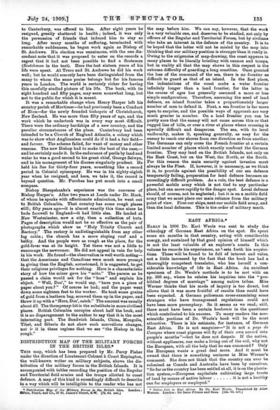THREE BISHOPS.* FOURTEEN out of the fifty years of Bishop
Wilkinson* ministerial life were spent in London parishes. Two years in the poor district of St. Peter's, Windmill Street, showed what he was. His preaching attracted distinguished hearers; Lord Derby, Mr. Gladstone, and the Bishop of London (Tait) were among them. In 1870 the Bishop (not Tait, but his successor) offered him St. Peter's, Eaton Square. The twelve years which followed were a memorable period in London Church history, His preaching was a power of which the memory still survives. It must be ranked with that of Henry Melville (to go back to an earlier generation), of Samuel Wilberforce, and of H. P. Liddon. Everybody went to hear him. Matthew Arnold went on a memorable occasion when the preacher defended missions (of the revivalist kind). His criticism is characteristic. "I do not much believe in good being done by a man unless he can give light, and Wilkinson's fire is very turbid ; but his power of heating, penetrating, and agitating is extraordinary." In 1882 the bishopric of Truro, vacant by the translation of Dr. Benson
* (1) Memoir of George Howard Wilkinson, Bishop of St. Andrews. By A. Mason, D.D. 2 vols. London : Longmans [Me, net.-j—(2) Bieltop Harper and the Canterbury Settlement. By H. T. Parches, M.A. London Whitoombe and Tombs. [5s.—(3) A Bishopiis the Bough. Edited by the Rev. Wallace Duthie. London: Smith, Elder, and CO. flaAtl. not.-1 to Canterbury, was offered to him. After eight years he resigned, greatly shattered in health ; indeed, it was only the persuasion of friends that induced him to stay so long. After many months of suffering, terminated with remarkable suddenness, be began work again as Bishop of St. Andrews. His election was unanimous, with the one dis- cordant note that it was proposed to enter on the records a regret that it had not been possible to find a Scotsman (Seotehman in the text). Here the last sixteen years of his life were spent. At Truro and St. Andrews he did his work well; but he would scarcely have been distinguished from the many to whom the same praise belongs but for his famous years in London. The world is certainly richer for having this carefully studied picture of his life. The book, with its eight hundred and fifty pages, may seem somewhat long, but not to the public for which it is meant.
It was a remarkable change when Henry Harper left his country parish of Mortimer—he bad previously been a Conduct of Eton—for the newly founded bishopric of Christchurch, New Zealand. He was more than fifty years of age, and the work which he undertook was in every way most difficult. There were the ordinary hardships of a new country, and the peculiar circumstances of the place. Canterbury had been intended to be a Church of England Atlantis, a colony which was to show what Anglicanism could do if it had a fair field—. and favour. The scheme failed, for want of money and other reasons. The new Bishop had to make the best of the case,— and he certainly made it. In the endurance of perils by land and water he was a good second to his great chief, George Selwyn, and in his management of his diocese singularly prudent. He held his See for thirty-four years, something like a record period in Colonial episcopacy. He was in his eighty-eighth year when he resigned, and here, we take it, the record is beyond question. Mr. Parchas has put much into a small compass.
Bishop Sheepshanks's experience was the converse of Bishop Harper's. After two years at Leeds under Dr. Hook, of whom he speaks with affectionate admiration, he went out to British Columbia. That country has some rough places still; fifty years ago—it is almost exactly this time since he bade farewell to England—it had little else. He landed at New Westminster, now a city, then a collection of huts. Pages of description would not be so effective as the pair of photographs which show us "Holy Trinity Church and Rectory." The rectory is undistinguishable from any other log cabin ; the church has a more sloping roof and a belfry. And the people were as rough as the place, for the gold-fever was at its height. Yet there was not a little to encourage the newcomer. He did not appeal in vain for help in his work. He found—the observation is well worth noting— that the Americans and Canadians were much more prompt in giving than the English, accustomed, it is suggested, to get their religious privileges for nothing. Here is a characteristic story of how the miner gave his "mite." The parson as he passed a claim would ask for the "boss" and explain his object. "Well, Doc'," he would say, "have you a piece of paper about you ? " Of course he had; and the paper went down some eighteen feet to the worker. •He took some grains of gold from a leathern bag, screwed them up in the paper, and threw it up with a "Here, Doc', catch." The amount was usually about £2. The threepenny-bit is the substitute in more civilised places. British Columbia occupies about half the book, and it is no disparagement to the author to say that it is the most interesting part. The Sandwich Islands, China, Mongolia, Tibet, and Siberia do not show such marvellous changes, nor IF it in these regions that we see "the Bishop in the rough."



































 Previous page
Previous page